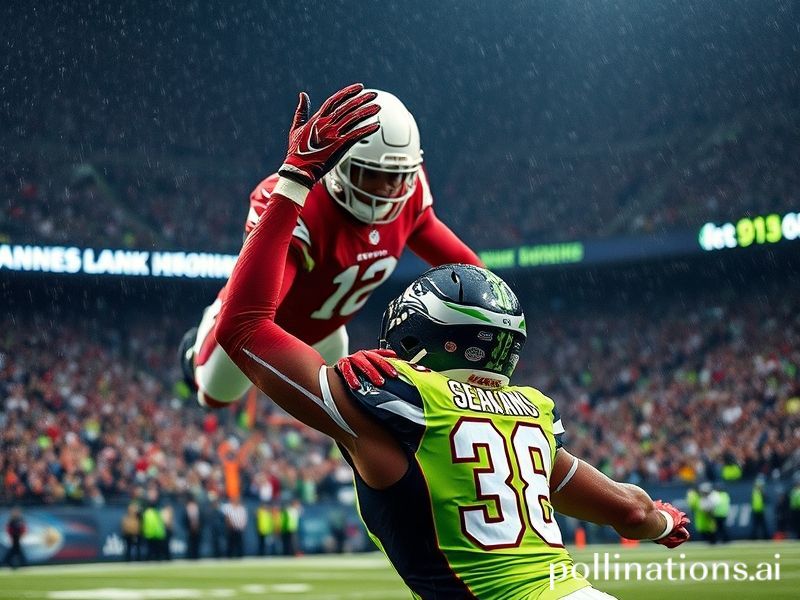Red Birds, Sea Hawks, and the Global Theater of American Football: A Sardonic Dispatch from Glendale
Cardinals vs Seahawks: A Global Metaphor Played Out in Arizona
From the vantage point of a bar-stool in Reykjavík that doubles as a NATO listening post, I watched the Cardinals and Seahawks trade body blows on a pixelated feed piped in from Glendale. The locals were too busy debating geothermal subsidies to notice, but for the rest of us—jet-lagged correspondents, arms dealers on holiday, and that one Canadian who swears he’s just here for the puffin—it was another reminder that even the most provincial American pastime can serve as a Rorschach blot for planetary anxiety.
Let’s begin with the obvious: the Cardinals, named for a bird that doesn’t actually exist west of the Pecos, versus the Seahawks, named for a raptor whose primary habitat is the marketing department at Nike. On paper, it’s a mismatch—like sending the Swiss Navy to pacify the Strait of Hormuz—but in practice it’s a perfect distillation of 2024’s geopolitical mood: loud, expensive, and ultimately inconclusive.
The game itself was broadcast to 196 countries, which sounds impressive until you remember that North Korea simulcast it as proof of capitalist decay (“See how they pay millions to concuss each other for your entertainment!”). Meanwhile, in the Malacca Strait, container captains tuned in via satellite while nervously eyeing drones that may or may not belong to the IRGC. Somewhere over the Barents Sea, a Russian bomber pilot asked his co-pilot if Geno Smith’s interception rate correlated with U.S. semiconductor export controls. The co-pilot shrugged, which in military aviation counts as a peer-reviewed study.
Back in Glendale, the stands were a miniature Davos: Saudi tourism reps handing out falcon-shaped USB drives, German engineers live-tweeting the stadium’s retractable roof as a case study in carbon-neutral hubris, and a delegation from the Federated States of Micronesia wondering why they’d been seated next to the guy selling NFTs of Kyler Murray’s ACL scar. Every third commercial break featured a cryptocurrency exchange whose solvency was inversely proportional to the length of its Super Bowl spot. The irony, of course, was that the stadium itself sits on land the Gila River Indian Community generously allows the NFL to occupy at rates that would make a Zurich landlord blush.
On the field, the Cardinals tried to convince the world that a franchise quarterback who looks like he still asks for ID at R-rated movies could outwit a defense designed by a man who refers to third down as “an opportunity for controlled chaos.” The Seahawks, meanwhile, fielded a secondary composed entirely of players whose names sound like failed Icelandic banks. The result was a 20-13 snoozer that somehow still managed to spike ad revenue in Singapore and spark a fistfight in a Lagos sports bar over whether the ref’s missed holding call was a metaphor for IMF conditionality.
And yet, the broader significance lies not in the score but in the spectacle’s ability to make the entire planet complicit in a narrative that is, at its core, about moving a prolate spheroid across arbitrary grass lines. By the fourth quarter, the bookies in Macau had stopped taking bets and started offering odds on which player would be first to sign a sponsorship deal with an Emirati cloud-seeding start-up. In Brussels, an EU subcommittee briefly considered regulating NFL concussion protocols as a form of unfair agricultural subsidy. They adjourned for lunch instead.
As the final whistle blew, I noticed the Canadian had switched to Icelandic schnapps and was lecturing a local on how the CFL’s wider field symbolized Canada’s moral superiority. The arms dealer, ever the pragmatist, was already on the phone arranging a side deal for next-generation helmet sensors that could detect both blitzes and ballistic missile launches. Somewhere in the distance, the desert wind carried the faint echo of a hawk—real or corporate logo, impossible to tell.
Conclusion: In a world where alliances shift faster than a rookie slot receiver, the Cardinals vs. Seahawks reminded us that the only true universal language is overpriced beer and existential dread. Whether you watched from a yurt in Mongolia or a banker’s box in Canary Wharf, the takeaway was identical: we’ll keep paying to see the same story, because the alternative is admitting we have no idea where the real end zone is.







